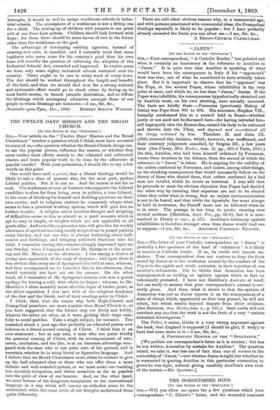" JANUS."
[TO THE EDITOR OF THE "SPECTATOR.1
SIR,—Your correspondent, " A Catholic Reader," has pointed out what is certainly an inaccuracy in the reference to Auxilius in "Janus." It is quite true that Auxilius is speaking of what would have been the consequence in Italy if his "opponent's" view was true, not of what he considered to have actually taken place. But it is important to observe that his " opponent" was the Pope, or the several Popes, whose infallibility is the very point at issue, and which he, no less than "Janus," denies. If the Popes were infallible, the consequences hypothetically sketched out by Auxilitis must, on his own showing, have actually occurred. The facts are briefly these :—Formosus (previously Bishop of Ostia) was Pope from 891 to 896. His successor, Stephen VII., formally condemned him at a council held in Rome—whether justly or not need not be discussed here—for having intruded him- self improperly into the Roman See, caused his body to be exhumed and thrown into the Tiber, and deposed and re-ordained all the clergy ordained by him. Theodore II. and John IX. (898) reversed this decision, which, however, was reaffirmed, and their contrary judgments annulled, by Sergius IH., a few years later. (See Fleury, Hist. Eccles., tom. iii. pp., 565-6 Paris, 1840.) On this, Auxilius, who had been himself ordained by Formosus, wrote three treatises in his defence, from the second of which the reference in " Janus " is taken. He is arguing for the validity of the orders conferred by Formosus, and insists, among other things, on the shocking consequences that would necessarily follow on the theory of those who denied them, that orders conferred by a bad man are invalid, which he treats as heretical. I may add that he proceeds to meet the obvious objection that Popes had decided the other way by insisting that superiors are not to be obeyed when they order what is wrong, that an unjust excommunication is not to be feared, and that while the Apostolic See must always be held in reverence, the Pontiff must not be followed when he is in error. The passage is too long to quote, running over several sections (Mabillon, Anal. Vet., pp. 38-9), but it is sum- marized in Fleury ut supr., p. 575. Auxilius's testimony against infallibilism is therefore stronger even than Janus would lead one to suppose.—I am, Sir, &c., ANOTHER CATHOLIC READER.


































 Previous page
Previous page